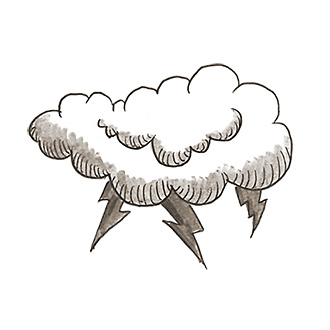
Related Questions
- Is there a way to harness electricity from lightning?
- Can we use heat generated from an air conditioner or refrigerator?
- What’s the difference between fuel efficiency and fuel economy?
- Can traditional gasoline-powered cars be converted to run on hydrogen fuel cells?
- What is “clean” coal?
- Can sound be converted to useful energy?
- Could we use exercise machines as energy sources?
- How can solar cells become cost-effective enough to be commercially viable?
- Which is more likely to happen first: solar panels on every home, or giant solar power plants?
- What’s the difference between AC and DC?
Why do the products of a nuclear fission reaction in uranium have three neutrons but not three protons?
For the same reason that opposites attract and alikes repel...
By Jason M. Rubin“To understand why this occurs we must first understand the forces involved in producing a nucleus,” says Dennis Whyte, professor of nuclear science and engineering at MIT’s Plasma Science & Fusion center. “Every nucleus is made up of protons and neutrons,” he says. “Protons are particles with an electric charge. Their electrostatic force always wants to push protons apart from each other, and that force only gets stronger the closer you put the protons together. Neutrons, on the other hand, have no electric charge and therefore cannot feel this force.”
How, then, does a nucleus stay together when the electrostatic force wants to push its particles apart? According to Whyte, it is because of another fundamental force of nature, known by the foreboding name of the “strong nuclear” force. “Unlike an electrostatic force, the strong nuclear force acts on both neutrons and protons,” he says. “It also has the special property of only exerting itself when particles are very, very close to one another — in fact, it goes to zero if the particles are further apart than about the size of the nucleus.”
This strong force keeps the electrostatic force in check and allows the nucleus to stay together — but in the face of nuclear fission, all bets are off. According to Whyte, “In fission the nucleus is barely stable because it has so many protons (92 in the case of uranium). To produce a more stabilizing ‘strong’ force, it has to add neutrons and as a result ends up with about 50% more neutrons than protons.” The actual fission event is the nucleus becoming unstable (either on its own or triggered by an external neutron) and breaking apart. This occurs if two different sections of the nucleus get too far apart — the repelling electrostatic force suddenly wins over the strong force and the nucleus blows up, releasing energy.
“The resulting two nuclei are highly excited because of the net energy release in the fission,” says Whyte. “Also, they have a large surplus of neutrons because each nucleus now has about half the protons of the uranium.”
Thanks to Huang Baishen for this question.
Posted: February 16, 2010